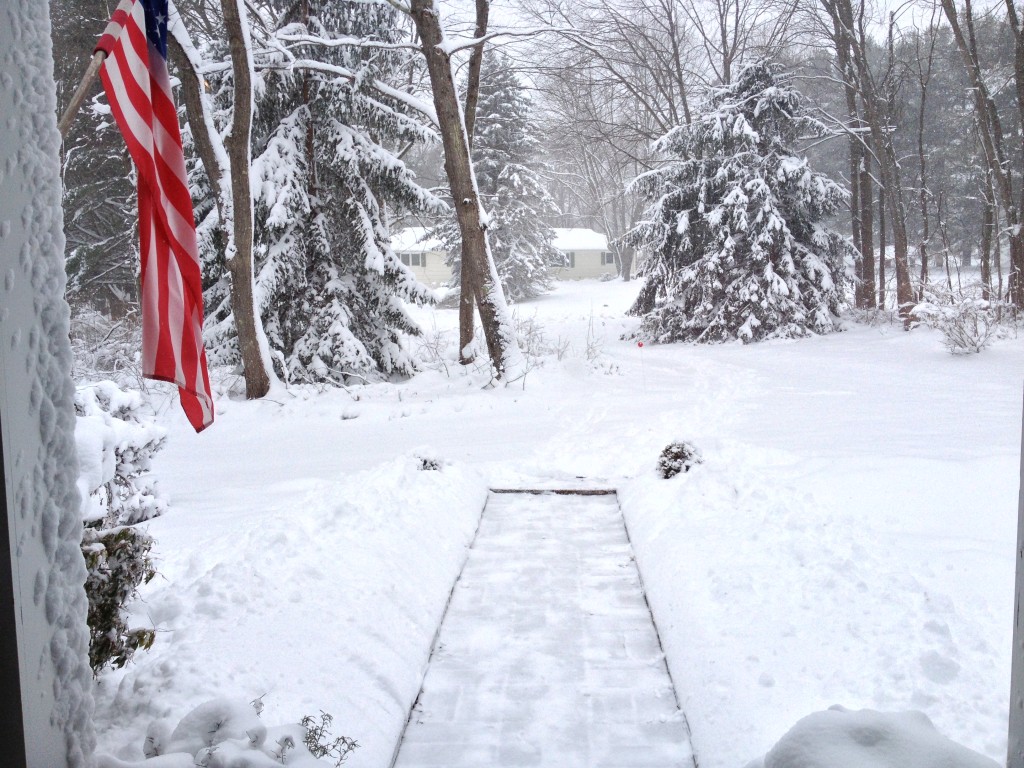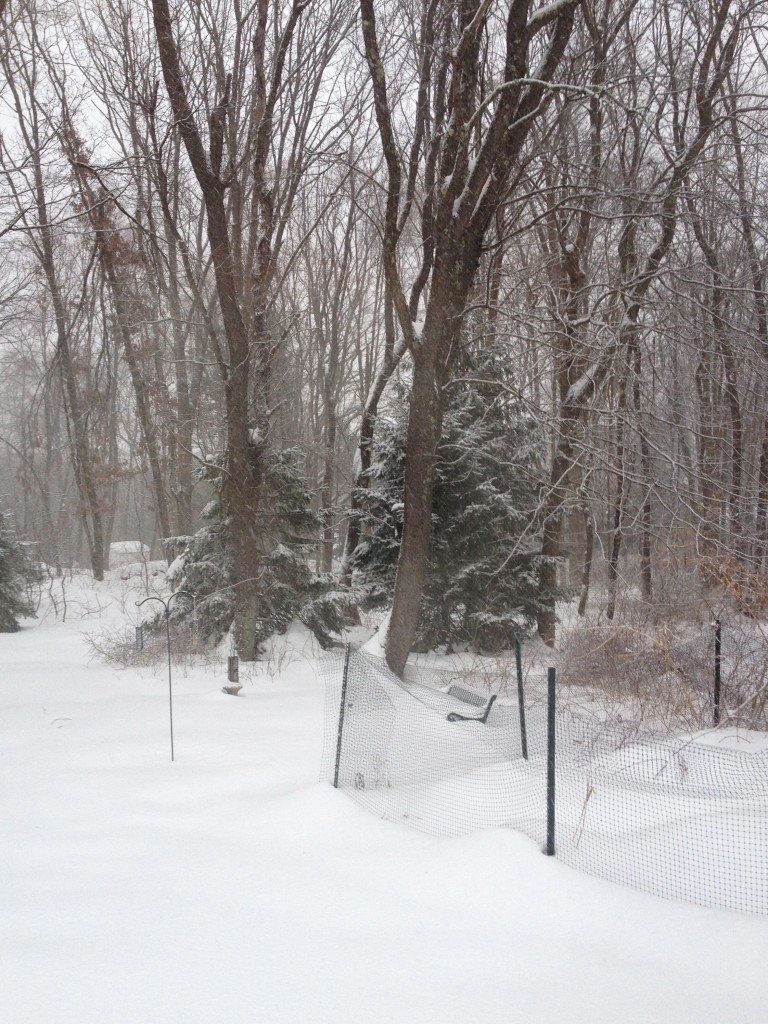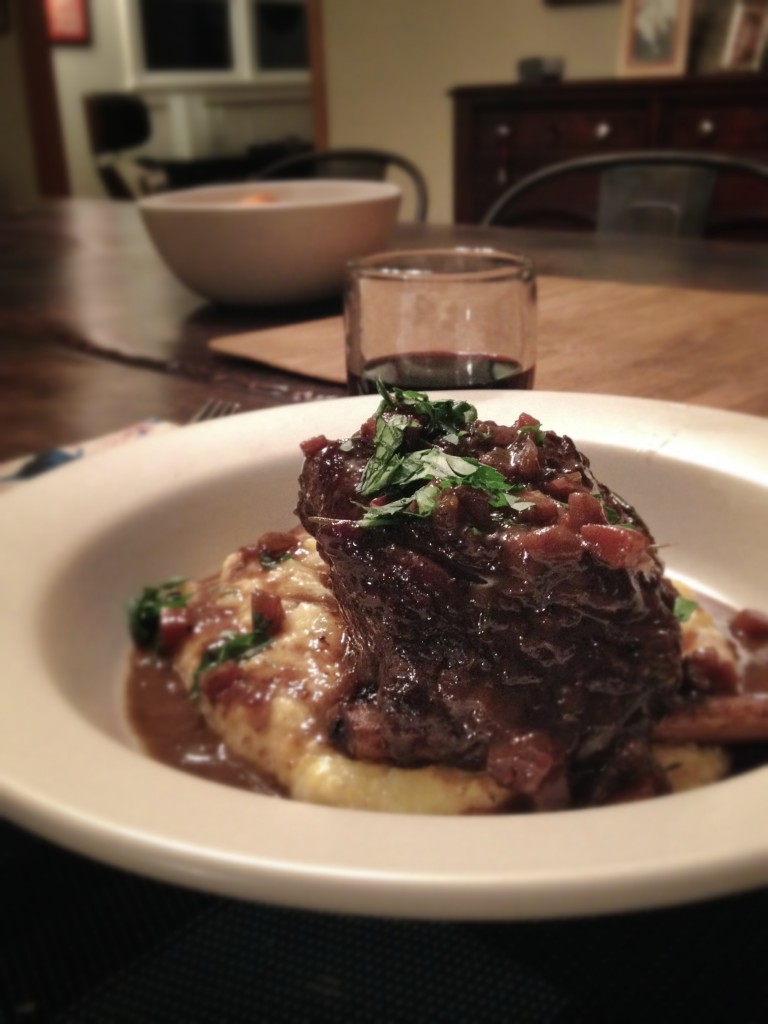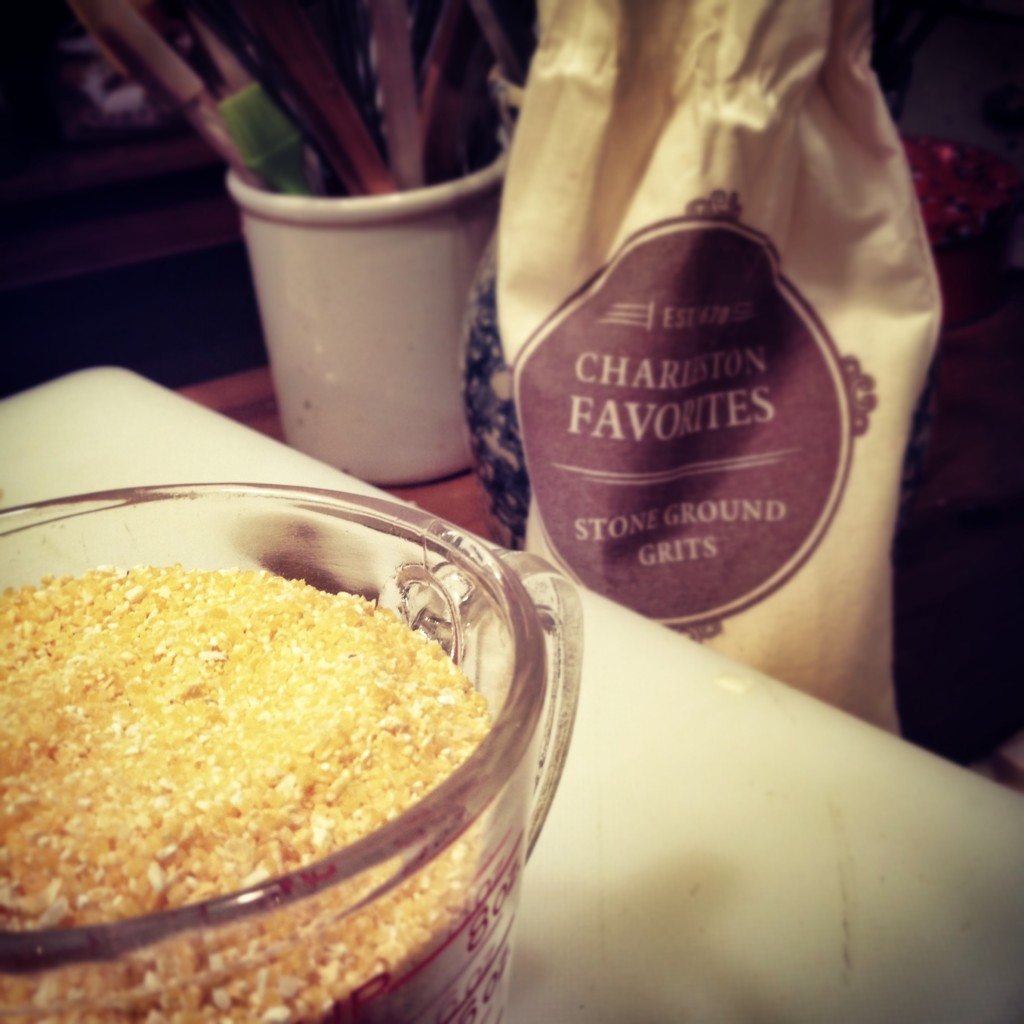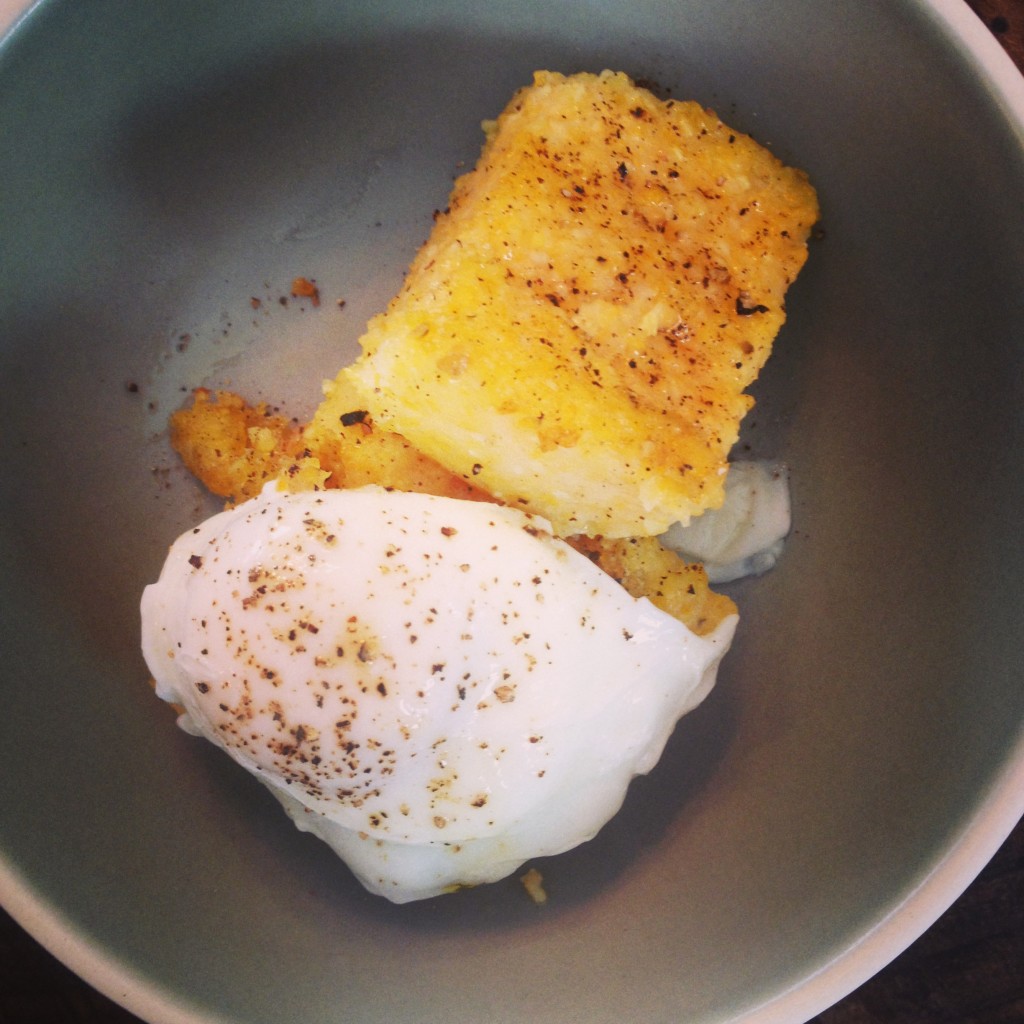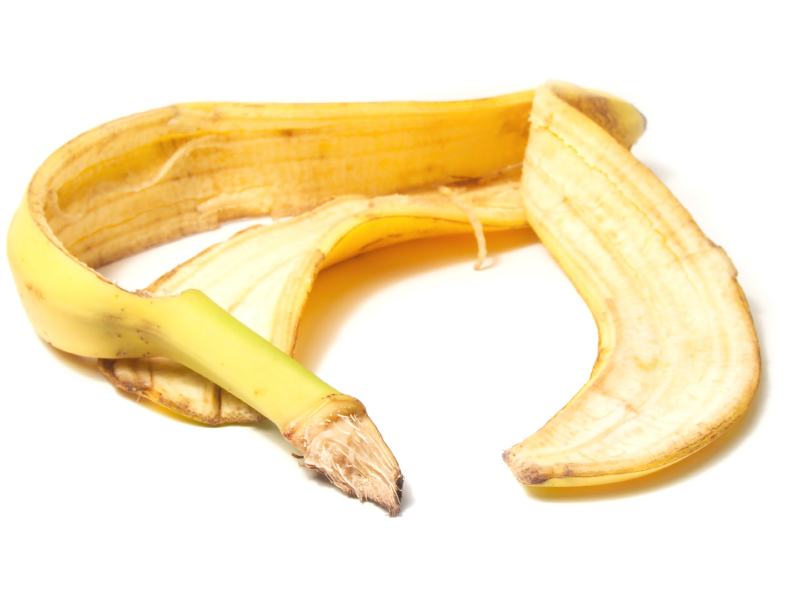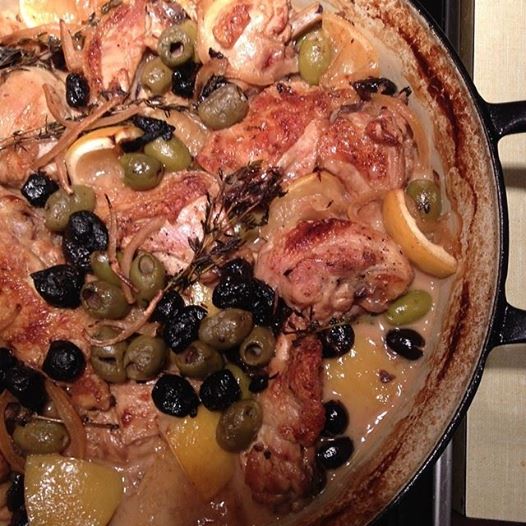I’m sitting in my office right now and staring out the window at a stupid amount of snow.
And it’s snowing as I write this. Again.
One minute the sky is blue, and then, it isn’t.
Another foot is supposed to come tomorrow.
The snow started to fall a few months ago and for a long while, it just didn’t stop; the garden Buddha in the way back, marking the spot where my beloved cats Cleo and Viola are buried, is completely obscured. The bottom of the birdbath is resting on the surface, like a giant hockey puck, which means that we have, all told, about three and a half feet to contend with. Our stoic Yankee plow guy worries that there’s nowhere to put it all, and every time he shows up to shovel out our circular driveway, the piles he makes just grow higher and more threatening. There are no paths to walk to the garden or to deliver heating oil; when the dogs go out to pee, they sink in almost over their heads and emerge surprised, their beards flocked with dripping, icy, dog snot.
My dogs are not Orvis Dogs; they are annoyed, half-Jewish dogs who frown on inclement weather.
This much snow is as threatening as it is beautiful; gutters have to be de-iced, foundations have to be checked for cracks, tree branches collapsing under the weight of precipitation have to be sawed away like gangrenous limbs. Last week, I had six guys standing on my roof with shovels; everyone in New England has heard stories of twenty foot lengths of gutter coming down into the snow, only to be discovered in spring. Late at night, after Susan goes to sleep and I stay up to read for a bit, the house creaks and groans in the cold.
“It’s just the heat,” she says, when I reach for her hand. I know she’s right, but the noise makes me feel queasy and unmoored, like I forgot to pay my taxes, or like maybe that pesky tumor that’s been going around has returned. This much lack of control undoes me.
I don’t expect that we’ll see the ground again until late March or early April, traditionally that time of sweet renewal and rebirth. The great melt will coincide with the year anniversary of the publication of Poor Man’s Feast; the year anniversary of the thirteen-city, 9,000-mile book tour that took me from coast to coast; the year anniversary of my stepmom getting sick; the year anniversary of my mother-in-law getting sick; the year anniversary of my relationship with people I’ve loved forever falling apart; the year anniversary of my living, daily, with such profound joy and pain so withering that it’s almost absurd in its ridiculousness, if pain could ever be absurd. Snow is beautiful, and it’s dangerous; you can step into a crevasse and be gone forever. Joy and sorrow are plaited together, too: pull one loose strand and the whole thing unravels like a cheap sweater.
A year ago, when my mother-in-law had her heart attack, I wrote here that life unfolds, and about my friend, David Rakoff, who used to say, Don’t get too comfortable. And I don’t, anymore. Because nothing — really, nothing — stays. The Buddhists know this; their whole practice is based on impermanence. The rest of us? I’m not so sure. We want things to remain exactly the way they are. The devil you know. Comfort is key. No surprises. Sunny and 70, every day. People behave. Everyone wants life to be a lemon-yellow ’82 Cadillac with soft shocks and a moon roof.
Instead, life moves forward and drags you along with it, for better and worse: you can go along willingly, with a sense of nervous wonder, or you can go along caveman-style. Or, you can get left behind, like the broken gutters that you don’t even notice are buried in the snow until the sun comes out, sheds light on them, and you realize your house is in serious trouble.
So, even as the beautiful, dangerous snow falls, I am moving forward with a sense of nervous, panicky wonder, or at least I’m trying to: right around the first anniversary of Poor Man’s Feast, I’ll be starting a new book — another memoir — that I haven’t talked about much, and likely won’t, beyond saying that it’s about rule breaking, the cost of acceptance and love, and the often bizarre hoops we jump through in order to attain those two things. And yes, food will be involved, front and center, as a main character.
I look forward to seeing the ground again — to being able to dig around in the garden and amend the soil and plant the earliest of our vegetables — right around the time that my notes and scribbles become the beginnings of a new first draft filled with surprise, wonder, and hope.
Snow, more snow, weird anniversaries both joyful and sad, and new beginnings. Moving forward with trepidation. Cooking for my heart and my nerves.
Braised Short Ribs with Polenta
I’ve never been much of a restaurant short ribs fan; very often, they’re not afforded the time it takes for them to cross the threshold from jiggly to tender and luscious. Made well, however, they are rapturously comforting. So a few weeks ago, in the throes of one of the bigger storms we’ve had this year, I set out to make them in as slow a manner as possible: we were snowed in, the cars were snowed in, the plow guy hadn’t come, the town hadn’t spread sand on the roads, and I was making a lot of Shining jokes. I had the forethought to pick up the ribs before the snow started to fall, but beyond that, these were cooked with nothing more than what we had in the house — red wine, beef stock, coffee — and time.
The polenta recipe is a combination of Marcella Hazan‘s and Laurie Colwin’s: Marcella’s for the basic method (I have my own, but I’ve been thinking a lot about this great lady, so this was my way of having her in the kitchen), and Laurie’s for the addition of Parmigiana Reggiano (and because I always feel her, staring over my shoulder). My Southern friends scoffed at me for making it (this time) with excellent quality grits; it was all we had in the house.
Notes: The coffee, as many brisket/pot roast makers know, adds a level of earthy, round depth to this dish; its natural bitterness is neutralized with a tablespoon of buckwheat (or other dark) honey. This is cooked in sunflower oil because of its high burn point; I’ve found that olive oil blackens too quickly. Leftover polenta should immediately be poured into a greased baking dish, covered, and refrigerated. To serve, slice into squares, fry in olive oil, and top with a poached egg.
Serves 2-3 with significant leftovers
For the short ribs
1/4 cup diced pancetta
1 tablespoons extra virgin olive oil
1 large carrot, peeled and diced
1 medium onion, diced
1 large celery stalk, diced
salt and black pepper, to taste
2-1/2 pounds meaty short ribs, at room temperature
1/4 cup flour for dredging*
2 tablespoons sunflower or grapeseed oil
3 cups beef stock
2 cups hearty red wine
1 tablespoon strong instant coffee (I used Starbucks Italian roast)
1 tablespoon buckwheat, or other dark honey
3 sprigs fresh thyme
1 bay leaf
2 tablespoons chopped flat-leaf parsley
*Use either all-purpose flour, or, if you’re GF, white rice flour.
In a large, oven-proof Dutch oven (preferably enameled cast iron) set over medium heat, cook the pancetta in the olive oil until the pancetta browns, rendering its fat, about six minutes. Using a slotted spoon, remove to a plate lined with a paper towel. Add the carrots, onion, and celery to the pot and cook slowly, letting the vegetables sweat and soften in the fat. When tender, remove them, too, to a plate lined with a paper towel.
Preheat oven to 325 degrees F. Salt and pepper the short ribs; place the flour in a wide, flat bowl, and dredge each rib, shaking off the excess. Add the sunflower oil to the pan, raise the heat to medium high, and when the oil is hot but not smoking, brown the ribs on all sides, in batches of three, removing them to a platter as they brown. Take your time; your goal is to get a crusty brown rime on all sides of the meat. This should take half an hour; return all the meat to the pot, along with its accumulated juices.
Add the pancetta and vegetables back to the pot, along with the stock and wine; bring to a slow boil, and sprinkle in the instant coffee grounds. Stir in the honey and combine well; the meat should be nearly — but not totally — submerged. Add the thyme and the bay leaf, cover the pot, and place on the middle rack in the oven. Cook for three hours, stirring the pot occasionally (and gently; short ribs notoriously like to separate themselves from their bone if jostled). At the end of three hours, the braising liquid should be thick and nearly syrupy; taste for seasoning and adjust if necessary.
Remove the cover from the pot and continue to cook for another hour, frequently spooning the now-reduced braising liquid over the meat. The ribs are done when they are knife-tender; at this point, if you want to refrigerate or freeze them, let them come to room temperature first and store them in their braising liquid.
Remove the bay leaf, and ladle out into warm, broad bowls, on top of polenta (or noodles, or rice). Sprinkle with fresh parsley and serve immediately.
For the polenta
1 tablespoon salt
2 cups coarse-ground cornmeal
1/2 cup grated Parmigiana Reggiano
Pinch red pepper flakes
Pinch of salt, to taste
Bring 6-1/2 cups water to a boil in a large, heavy Dutch oven or soup pot. Add the salt, reduce the heat so that the water is simmering, and add the cornmeal slowly, stirring it all the while with a heavy, wooden spoon. Continue to stir, constantly, keeping the water at a simmer, for twenty minutes. Fold in the Parmigiana Reggiano and the red pepper flakes, and, if desired, the salt. The polenta is done when it pulls away from the sides of the pot as you stir. Serve immediately.
